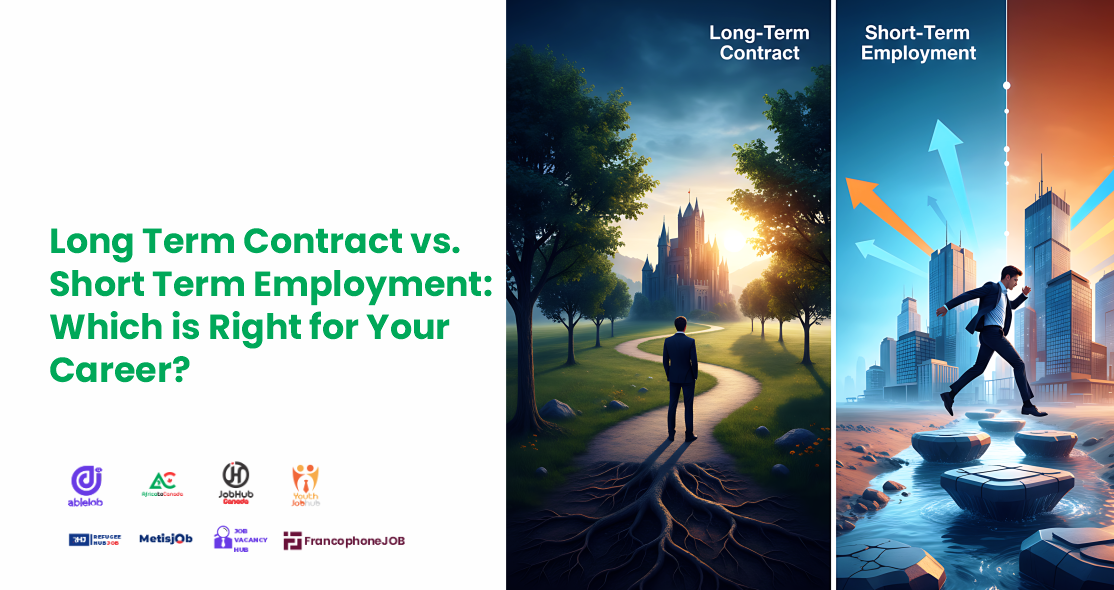November 10, 2025

When you’re navigating today’s dynamic job market, you’ll encounter two main types of non-traditional roles: long-term contracts (often 6–12 months or longer) and short-term employment (sometimes called temporary or temp-to-perm roles, often 1–6 months).
Both offer a powerful alternative to traditional permanent employment, yet they serve very different career purposes. Choosing the right one depends entirely on your current financial, professional, and personal goals. As your career advisor, we break down the pros and cons of each path to help you make an informed decision.
The Case for Short-Term Employment: Flexibility and Variety
Short-term employment, whether it’s a temporary assignment or a brief project-based contract, is about maximum flexibility and rapid skill diversification.
|
Pros of Short-Term Employment |
Cons of Short-Term Employment |
|
Rapid Skill Acquisition: You gain exposure to multiple industries, software stacks, and company cultures in a short time, diversifying your resume quickly. |
Income Fluctuation: There may be gaps in employment between assignments, requiring careful financial planning. |
|
High Flexibility: Ideal for those transitioning careers, returning to the workforce, or balancing work with other commitments like school or family. |
Limited Benefits: Benefits (health, retirement, paid time off) are often minimal or nonexistent, requiring you to manage these independently. |
|
The "Foot in the Door": Many short-term roles are temp-to-perm, acting as a trial period where you can convert to a permanent role if it's a mutual fit. |
Less Company Investment: Companies are less likely to invest in expensive training or long-term professional development. |
When to Choose It: Choose short-term employment if you are new to an industry, actively trying to broaden your technical skills, or using the assignment as a strategic stepping stone to scout a company for a potential long-term fit. It's an excellent way to fill a gap on your CV while networking.
⏳ The Case for Long-Term Contracts: Stability and Financial Gain
A long-term contract is often treated like a permanent job—you’re embedded in a team, have daily responsibilities, and the term is clearly defined. The key difference is often the pay structure and the lack of traditional employee status.
|
Pros of Long-Term Contracts |
Cons of Long-Term Contracts |
|
Higher Earning Potential: Contractors typically receive a higher hourly rate (sometimes significantly higher) to compensate for the lack of benefits and long-term security. |
Defined End Date: Although long, the contract still has an expiry. You must actively plan your next move before the current one ends. |
|
Deep Project Focus: You gain in-depth experience by driving large, complex, or high-impact projects from start to finish. |
Tax and Admin Burden: You may be classified as an independent contractor, making you responsible for your own taxes, insurance, and retirement contributions. |
|
Clear Boundaries: Because your role is tied to a specific project or term, work-life balance can be easier to enforce compared to an open-ended permanent role. |
Exclusion from Culture: You may miss out on some perks, internal promotions, or social activities reserved exclusively for permanent staff. |
When to Choose It: Opt for a long-term contract if you have specialised, in-demand skills that command a premium rate. It’s ideal if you’re financially stable enough to manage your own benefits and are looking to maximise income or complete a specific, portfolio-building project.
Making Your Decision
The ultimate choice is a reflection of your current career priorities:
No matter which path you choose, working with an advisory partner like us ensures you are matched not just with a job but with an opportunity that actively moves your career forward. We can advise you on competitive contract rates and identify the temp-to-perm roles that are the best fit for your long-term goals.